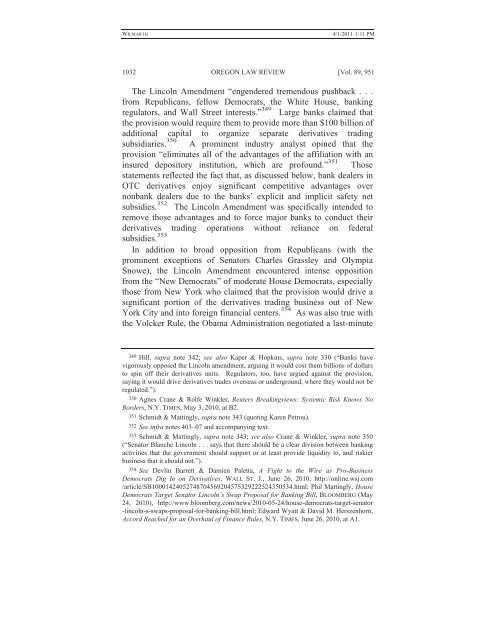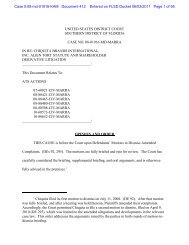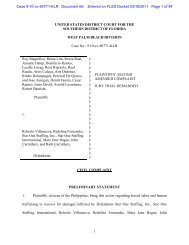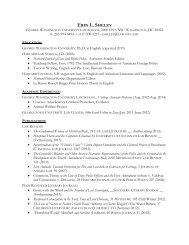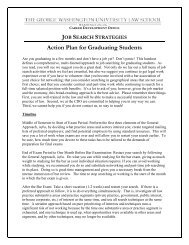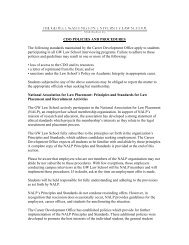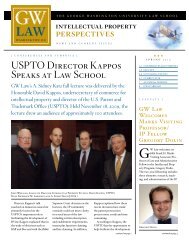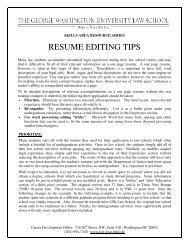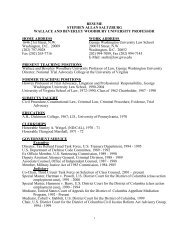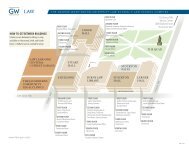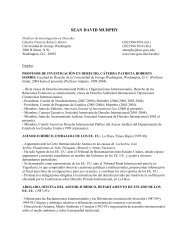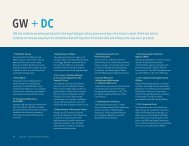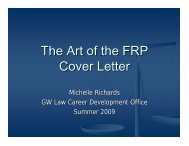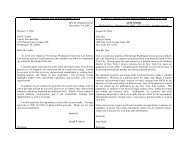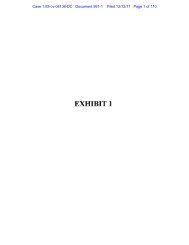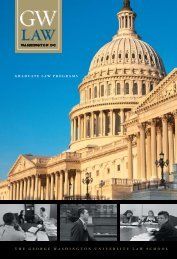CLE Materials for Panel #1 - George Washington University Law ...
CLE Materials for Panel #1 - George Washington University Law ...
CLE Materials for Panel #1 - George Washington University Law ...
Create successful ePaper yourself
Turn your PDF publications into a flip-book with our unique Google optimized e-Paper software.
WILMARTH<br />
4/1/2011 1:11 PM<br />
1032 OREGON LAW REVIEW [Vol. 89, 951<br />
The Lincoln Amendment “engendered tremendous pushback . . .<br />
from Republicans, fellow Democrats, the White House, banking<br />
regulators, and Wall Street interests.” 349 Large banks claimed that<br />
the provision would require them to provide more than $100 billion of<br />
additional capital to organize separate derivatives trading<br />
subsidiaries. 350 A prominent industry analyst opined that the<br />
provision “eliminates all of the advantages of the affiliation with an<br />
insured depository institution, which are profound.” 351 Those<br />
statements reflected the fact that, as discussed below, bank dealers in<br />
OTC derivatives enjoy significant competitive advantages over<br />
nonbank dealers due to the banks’ explicit and implicit safety net<br />
subsidies. 352 The Lincoln Amendment was specifically intended to<br />
remove those advantages and to <strong>for</strong>ce major banks to conduct their<br />
derivatives trading operations without reliance on federal<br />
subsidies. 353<br />
In addition to broad opposition from Republicans (with the<br />
prominent exceptions of Senators Charles Grassley and Olympia<br />
Snowe), the Lincoln Amendment encountered intense opposition<br />
from the “New Democrats” of moderate House Democrats, especially<br />
those from New York who claimed that the provision would drive a<br />
significant portion of the derivatives trading business out of New<br />
York City and into <strong>for</strong>eign financial centers. 354 As was also true with<br />
the Volcker Rule, the Obama Administration negotiated a last-minute<br />
349 Hill, supra note 342; see also Kaper & Hopkins, supra note 330 (“Banks have<br />
vigorously opposed the Lincoln amendment, arguing it would cost them billions of dollars<br />
to spin off their derivatives units. Regulators, too, have argued against the provision,<br />
saying it would drive derivatives trades overseas or underground, where they would not be<br />
regulated.”).<br />
350 Agnes Crane & Rolfe Winkler, Reuters Breakingviews: Systemic Risk Knows No<br />
Borders, N.Y. TIMES, May 3, 2010, at B2.<br />
351 Schmidt & Mattingly, supra note 343 (quoting Karen Petrou).<br />
352 See infra notes 403–07 and accompanying text.<br />
353 Schmidt & Mattingly, supra note 343; see also Crane & Winkler, supra note 350<br />
(“Senator Blanche Lincoln . . . says that there should be a clear division between banking<br />
activities that the government should support or at least provide liquidity to, and riskier<br />
business that it should not.”).<br />
354 See Devlin Barrett & Damien Paletta, A Fight to the Wire as Pro-Business<br />
Democrats Dig In on Derivatives, WALL ST. J., June 26, 2010, http://online.wsj.com<br />
/article/SB10001424052748704569204575329222524350534.html; Phil Mattingly, House<br />
Democrats Target Senator Lincoln’s Swap Proposal <strong>for</strong> Banking Bill, BLOOMBERG (May<br />
24, 2010), http://www.bloomberg.com/news/2010-05-24/house-democrats-target-senator<br />
-lincoln-s-swaps-proposal-<strong>for</strong>-banking-bill.html; Edward Wyatt & David M. Herszenhorn,<br />
Accord Reached <strong>for</strong> an Overhaul of Finance Rules, N.Y. TIMES, June 26, 2010, at A1.


